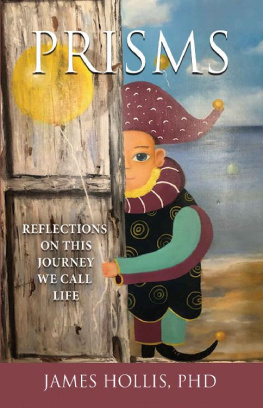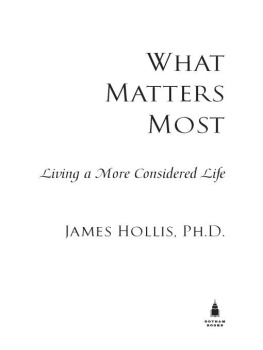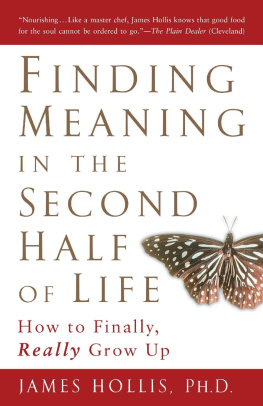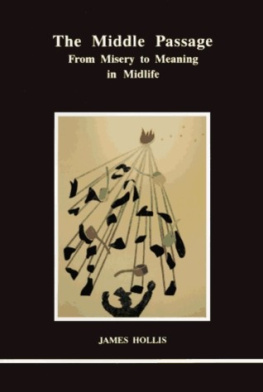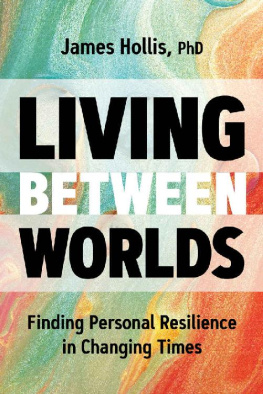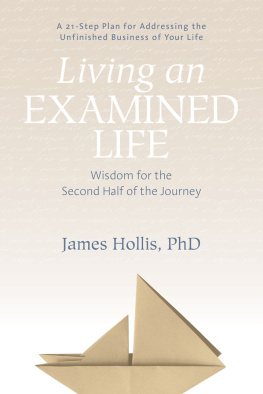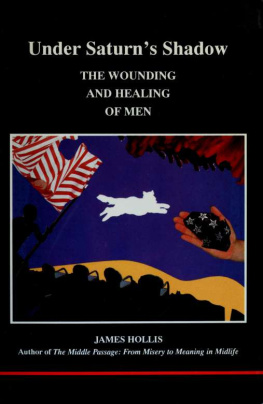James Hollis - Prisms: Reflections on This Journey We Call Life
Here you can read online James Hollis - Prisms: Reflections on This Journey We Call Life full text of the book (entire story) in english for free. Download pdf and epub, get meaning, cover and reviews about this ebook. year: 2021, publisher: Chiron Publications, genre: Romance novel. Description of the work, (preface) as well as reviews are available. Best literature library LitArk.com created for fans of good reading and offers a wide selection of genres:
Romance novel
Science fiction
Adventure
Detective
Science
History
Home and family
Prose
Art
Politics
Computer
Non-fiction
Religion
Business
Children
Humor
Choose a favorite category and find really read worthwhile books. Enjoy immersion in the world of imagination, feel the emotions of the characters or learn something new for yourself, make an fascinating discovery.
- Book:Prisms: Reflections on This Journey We Call Life
- Author:
- Publisher:Chiron Publications
- Genre:
- Year:2021
- Rating:4 / 5
- Favourites:Add to favourites
- Your mark:
- 80
- 1
- 2
- 3
- 4
- 5
Prisms: Reflections on This Journey We Call Life: summary, description and annotation
We offer to read an annotation, description, summary or preface (depends on what the author of the book "Prisms: Reflections on This Journey We Call Life" wrote himself). If you haven't found the necessary information about the book — write in the comments, we will try to find it.
Prisms: Reflections on This Journey We Call Life — read online for free the complete book (whole text) full work
Below is the text of the book, divided by pages. System saving the place of the last page read, allows you to conveniently read the book "Prisms: Reflections on This Journey We Call Life" online for free, without having to search again every time where you left off. Put a bookmark, and you can go to the page where you finished reading at any time.
Font size:
Interval:
Bookmark:

2021 by Chiron Publications. All rights reserved. No part of this publication may be reproduced, stored in a retrieval system, or transmitted, in any form by any means, electronic, mechanical, photocopying, recording, or otherwise, without the prior written permission of the publisher, Chiron Publications, P.O. Box 19690, Asheville, N.C. 28815-1690.
www.ChironPublications.com
Interior and cover design by Danijela Mijailovic
Printed primarily in the United States of America.
ISBN 978-1-63051-929-2 paperback
ISBN 978-1-63051-930-8 hardcover
ISBN 978-1-63051-931-5 electronic
ISBN 978-1-63051-932-2 limited edition paperback
Library of Congress Cataloging-in-Publication Data Pending
- Harold Pinter: The Poetics of Silence
- The Middle Passage: From Misery to Meaning at Midlife
- Under Saturns Shadow: The Wounding and Healing of Men
- Tracking the Gods: The Place of Myth in Modern Life
- Swamplands of the Soul: New Life from Dismal Places
- The Eden Project: In Search of the Magical Other
- The Archetypal Imagination
- Creating a Life: Finding Your Individual Path
- On This Journey We Call our Life
- Mythologems: Incarnations of the Invisible World
- Finding Meaning in the Second Half of Life
- Why Good People Do Bad Things: Exploring Our Darker Selves
- What Matters Most: Living a More Considered Life
- Hauntings: Dispelling the Ghosts that Run Our Lives
- Living the Examined Life: Wisdom for the Second Half of the Journey
- Living Between Worlds: Finding Personal Resilience in Changing Times
I thank the following publishers for their permission to reprint these essays: Permutations of Desire, Parabola, Vol. 35, No. 3.
All Is Fire: The Imagination as Aperture into Psyche, The Unconscious Roots of Creativity, Kathryn Madden, Ed. Chiron Publications.
Narcissisms Forlorn Hope, A Clear and Present Danger: Narcissism in the Era of Donald Trump, Eds. Leonard Cruz and Steven Buser, Chiron Publications.
Theogonys and Therapies: A Jungian Perspective on Evil, Humanitys Dark Side: Evil, Destructive Experience, and Psychotherapy. Eds. Arthur C. Bohart, et al. American Psychological Association.
The Rag and Bone Shop of the Heart: Yeatss Passage from Puer Aeternus to Wise Old Man, Ed. Nancy Cater, Spring Publications.
For Every Tatter in Our Mortal Dress: Stayin Alive at the Front of the Mortal Parade, C. G. Jung and Aging: Possibilities and Potentials for the Second Half of Life, Eds. Leslie Sawin, Lionel Corbett, Michael Carbine. Spring Publications.
This book is dedicated to
My Jill,
And our children:
Taryn and Tim, Jonah and Seah
The people of the
Jung Society of Washington
and
With great thanks to
Steve Buser
Len Cruz
Jennifer Fitzgerald
Just so its clear
No whining on the journey.
If you whine, youll get stuck
Somewhere with people
Like yourself.
Stephen Dunn, Before We Leave
I keep thinking I could be, perhaps should be, a normal person and just turn on the telly and watch sports when not working at my day job as a therapist. (My team of choice is the Philadelphia Eagles, if you need to know. So for that reason, Dallas and New York fans will not get this book and should stop reading now). Unfortunately, the Daimon, apparently my Daimon, seems to have other ideas. Its rather like being a serial killer. I have normal desires, walk and talk normally, and then some sinister force takes over.
What is a Daimon, you ask. It is a tutelary spirit, a directive intermediary between the gods and humans. It is not a god and not a demon. It is an autonomous Hermetic link between higher and lower powers. (Hermes was the messenger of the gods; his Latin form became Mercury, the logo for Western Union). Plato said that Socrates did not speak; the Daimon spoke through him, using him for that purpose. And so too the artist who paints or composes. The Daimon directs the hand, provides the compelling energy. The human has only one choicewhether or not to submit to the Daimon.
The Daimon speaks to all of us in various ways although we often resist its urgent presence. Most of us, most of the time, find ways to slip-slide away from its invasive summons. Sometimes this avoidance leads to a quiet, untroubled life, but perhaps it also leads to a diminished journey, and sometimes it even pathologizes. As Jung once said, a neurosis is a repressed or a neglected god. So it is, I think, with the Daimon.
When I was a young adult, I dutifully wrote a dissertation on the tension of opposites as manifested in the life and work of the poet W. B. Yeats. Shortly after that, I wrote the first book in America on the relatively unknown British playwright Harold Pinterall this before age 30. To be employed in academia, I had to demonstrate that I could. And then I stopped for decades. As an academic, I was supposed to publish or perish. But something inside protested, and I dried up for two and a half decades. If I wanted to write under assignment, I would be a journalist or a copy writer for an advertising firmboth honorable professions, no doubt. But that internal resistance was compelling and apparently was asking something more from me than promotion or a small raise in salary.
I was a professor of humanities at private and state universities, and then from 1977-82, seeking, driven perhaps, to go deeper than the life of the conscious mind, entered Jungian analytic training at the Mother Ship in Zrich, the Jung-Institut. Upon returning, I started speaking and teaching in Philadelphia, which then spread to Wilmington, and then Ottawa, and then Atlanta, Portland, Seattle, Vancouver, and Montreal, and soon everywhere, most commonly at Jung societies. Then, unexpectedly, the Daimon arrived, pushed up through the floorboards of the adaptive self, and started hounding me. From that came 16 more books, plus a thesis in Zrich that became a book, and it hasnt let go of me yet. Often, I want to say, Stop, already! But it persists.
So, I see this book as late essays, given that all were written lately and given that I am 80 and dealing with at least two cancers. Since cancer took out the entire female side of my ancestors, I should say final, but I also know better not to predict anymore. The gods apparently laugh at such inflation and send the Daimon on its intrusive mission once again.
The reason I am spending the readers time on this subject, clearly the stuff of someone elses life, and not necessarily the readers, is that possibly I have learned something here that might be of to help the reader. But do continue warned. I said I resisted the external demands to publish in order to prove my competence, to get minuscule raises, promotion, a better office. And I am glad I did. But in the end I could not resist the insurgent demands of the Daimon within.
In the first half of life, our summons is to build an ego strong enough to enter the world, deal with it, meet its demands, and create a living space for ourselves in it. This is seemingly what growing up requires and all life apparently expects. But if we are privileged to live longer than that, we often find other, insistent demands beginning to wash up on our shores from the vast sea within. While I refused to submit to academia, I could not in the end refuse to submit to the Daimon. In fact, I think the meaning of the entire second half of life, (second half used more metaphorically than chronologically) is about finding, or submitting to, something larger than our ego needs, something larger than our complexes with their insistent chatter.
Font size:
Interval:
Bookmark:
Similar books «Prisms: Reflections on This Journey We Call Life»
Look at similar books to Prisms: Reflections on This Journey We Call Life. We have selected literature similar in name and meaning in the hope of providing readers with more options to find new, interesting, not yet read works.
Discussion, reviews of the book Prisms: Reflections on This Journey We Call Life and just readers' own opinions. Leave your comments, write what you think about the work, its meaning or the main characters. Specify what exactly you liked and what you didn't like, and why you think so.

